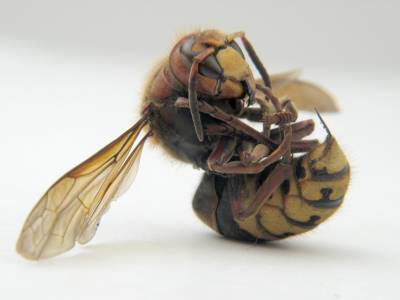Thousands of 'thieving bees' break into stores and try to steal honey

The Rushing River Apiary in British Columbia, Canada, was attacked by a horde of 'thieving bees' who allegedly entered through a crack in an old entrance and nearly stole all of its honey.
Thousands of 'robber bees' invade BC apiarist's shop in attempted honey heist | CBC News

One day in late August 2025, Christine McDonald, owner of Rushing River Bee Farm, encountered a situation where her store was filled with thousands of bees. McDonald, who has worked with bees for many years, said she felt more comfortable around them, but was terrified by the sight.
'It was probably the biggest panic I've ever felt,' MacDonald told the Canadian Broadcasting Corporation (CBC). 'You have thousands of bees, you don't know where they came from, and you have to protect all the honey.'
The photo below shows the shop's work area, which is actually filled with bees. If you look closely, you can see tiny bees everywhere.

by Christine McDonald
These bees are believed to have entered through a gap in an old entrance. According to McDonald, when bees find a good feeding spot, they have the habit of letting other bees know the location by performing a 'tail-wagging dance.' In this case, too, it is believed that the first bees to find the apiary's store attracted more and more bees, eventually resulting in a situation in which several thousand bees gathered.
To protect the honey, McDonald covered his equipment and products with tarpaulins to prevent the bees from stealing it. After that, he left the lights on in the bathroom to lure the invading bees, and when they gathered, he captured them and released them outside.
However, the bees recognized the apiary's store as a 'feeding area,' so they continued to return. Since that day, McDonald has blocked the gaps in the entrance with tape to prevent the bees from entering, and after four or five days, the bees finally stopped coming. McDonald says, 'I think the bees learned that there is no more food here, so they can't enter.'
This is how the gap at the entrance to the store is covered with tape.

by Christine McDonald
McDonald said that while outdoor hives have been attacked by other bees before, this is the first time an indoor facility has been targeted. 'Autumn is a very difficult time for beekeepers, as we have to make sure our bees are protected from other bees and hornets and protect the food they have worked so hard to store,' McDonald said.
'Bee robbing,' in which bees try to steal honey from other hives, is a common phenomenon from late summer to early autumn. Alison McAfee, a bee scientist at the University of British Columbia, points out that as bee populations approach their peak during this time of year when food resources such as nectar-producing flowers become scarce, some colonies may invade weaker colonies and steal their food. 'It's a kind of desperation, like a bear trying to fatten up for winter,' McAfee says.
Hornets also attack beehives in search of honey, but there are also cases where bees steal from each other, resulting in the death of entire colonies. 'We have a bad impression of hornets. We think, 'Oh, those hornets are attacking honeybee colonies and killing the bees,'' McAfee explained. 'But in reality, they often kill the bees of other colonies.'

After a few days of cleaning, McDonald was able to resume honey production. He said that the prolonged heat this summer may have made the bees more active than usual.
Related Posts:
in Creature, Posted by log1h_ik







